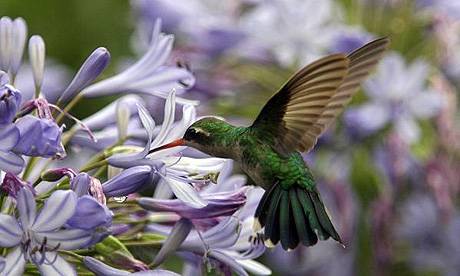Poem of the week: Hummingbird Mark Roper's lightness of touch captures the poise and beauty of this peculiar bird
Poise is the essence of this week's poem, Mark Roper's Hummingbird. It shows in its technique - and perhaps it is the poem's fundamental subject. Poise, a lovely word, is related to the Old French pois, meaning weight, and originally from the Latin, pendere. The bird is dizzyingly poised between rapid movement and stillness, and the poet weighs his words to create a language light and suggestive enough to encapsulate that quality of suspension, while tough enough to convey a miniature story.
One of the great strokes of combined luck and misfortune for contemporary poets (and the most perilous and interesting challenge to technical poise) is that poetic structure has expanded to include the representational. The 20th century form-quakes have left us with a vacant building site. If you want to write about a motorway, you can still build a sonnet around it. But you could also invent a poem that resembled a motorway (well, a very small stretch of one). The third possibility: you may negotiate an area between the two – which is what I think Mark Roper does, to some degree, in Hummingbird.

A hummingbird hovers over a flower in Montevideo. Photograph: Miguel Rojo/AFP/Getty Images
Of course, the poem isn't bird-shaped. But it seems to contain hummingbird construction principles at its core. There is economy (many of the words are monosyllables) and focus. As the bird goes "from shelf/ to shelf of air," so the poem moves purposefully from stanza to stanza. The structure is secured by firm syntax, arranged according to the trope, parison. "Not just" is repeated at the opening of four consecutive stanzas, forming moments of grammatical stasis, which are also launching pads from which the narrative pushes forward......
***
HummingbirdNot just how
it hung so still
in the quick of its wings,
all gem and temper
anchored in air;
not just the way
it moved from shelf
to shelf of air,
up down, here there,
without moving;
not just how it flicked
its tongue's thread
through each butter-yellow
foxglove flower
for its fix of sugar;
not just the vest's
electric emerald,
the scarf's scarlet,
not just the fury
of its berry-sized heart,
but also how the bird
would soon be found
in a tree nearby,
quiet as moss at the end
of a bare branch,
wings closed around
its sweetening being,
and then how light
might touch its throat
and make it glow,
as if it were the tip
of a cigarette
smouldering
on the lip of a world,
whose face,
in the lake's hush
and the stir of leaves,
might appear
for a moment
composed.



0 Comments:
Post a Comment
<< Home